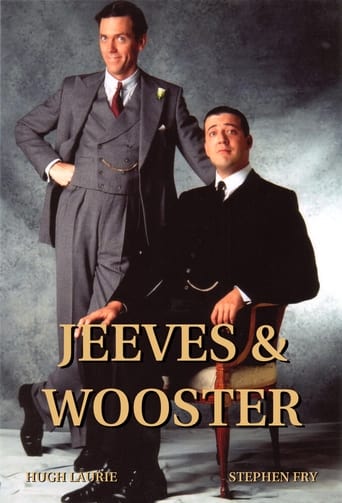

not as good as all the hype
... View MoreI am only giving this movie a 1 for the great cast, though I can't imagine what any of them were thinking. This movie was horrible
... View MoreThe movie really just wants to entertain people.
... View MoreOne of the film's great tricks is that, for a time, you think it will go down a rabbit hole of unrealistic glorification.
... View MoreIt's sort of hard to review this series as a whole, because it does have it's ups and downs. For this reason, I'm going to review each of the seasons in paragraphs.In the very first episode, we are introduced to Bertie Wooster, who is portrayed to perfection by Hugh Laurie. He is the sort of man who is rich, but somewhat dim-witted. Just when it looks like he can't take care of himself, a valet appears at the door, by name of Jeeves. Jeeves is a very smart man, who, no matter how bad a situation Wooster finds himself in, Jeeves always finds a brilliant way to save him. He also played to perfection by Stephen Fry. In fact, most of the characters in the series are perfectly portrayed. I don't mean they're legendary performances, but for the most part, they're done very well. However, the first season does fall short of good segues between plot lines. You see, each of the episodes have more than one plot line, which is part of what makes the series so entertaining. However, in episodes 2 and 3 of the first season sort of feels like two separate stories in each half of the episode. This isn't necessarily bad, but it does tend to catch you off guard, if you think that the episode is over, but is actually halfway through. However, the season did redeem itself in the two-part finale, which not only has multiple plot lines that fall perfectly into place, but the ending is beyond hilarious.The second season was much more refined, with better construction, more interesting characters, and hilarious twists. Not much more to say about this, but it's great. In fact, around this time, some of the episodes were set in America, which is a nice change of setting.The third season was also good, but around the end of the season, the humour could get a little over-the-top and silly. It just didn't have the witty charm that Jeeves and Wooster is so good at.By the fourth season, the silliness was about as much as it could get. Even though some of the episodes stood out as great, the finale's ending was just outlandishly silly, despite being enjoyable.To sum up the entire Jeeves and Wooster phenomenon, it's really a very well-done show, which does capture the spirit of the original stories by P.G. Wodehouse. The backdrop for the show is perfect, and makes you believe that the characters are in the 1920s. However, the best thing about it is the theme music. Not only is it very 1920s-style, but it's so catchy you'll never get it out of your head. So, on the whole, it's a very enjoyable and well done show, and I find it's often overlooked.
... View MoreWhen it comes to comedy doubles, Stephen Fry and Hugh Laurie are one of the best. Their work in 'Blackadder' and their own sketch show 'A Bit of Fry and Laurie' is brilliant, so their combination on 'Jeeves and Wooster' makes this more subtle comedy surprisingly funny.'Jeeves and Wooster' - based on the P.D. Wodehouse stories - is more a comedy of manners and a subtle class satire than a laugh-track supported sitcom we're normally spoonfed with, which makes it even more interesting. Laurie plays Bertie Wooster, a well-meaning, but ultimately dim man of society (who doesn't really seem to do anything of notice) and is more interested in fooling around with friends and defying his meddling Aunt Agatha. Fry plays his valet Reginald Jeeves, a man with reserved manners, address and decorum who has an at-times acid tongue and always seems to save Wooster and fix his many mistakes. In a way, Wooster is similar to Laurie's Prince George in 'Blackadder the Third'. While George's stupidity was more obvious, and used as a deliberate comic tool, Wooster is more of a well-meaning buffoon, who wants to do the right thing but has an inflated view of his own intelligence, while still remaining endearing. Stephen Fry's Jeeves is the star of the show. His quick wit and subtle sarcasm provide the majority of the laughs and his calm demeanour reflects the conservative setting.While the main plots revolve around Jeeves cleaning up Wooster's latest disaster, the hour-long duration gives you time to get to know the characters, which is important for a relatively "gentler" comedy.If you're a fan of Fry and Laurie, then check out 'Jeeves and Wooster', you won't regret it.
... View MoreI watched the show before reading the books, but I absolutely adore both. As others have said, the casting of the two main characters is perfect, though i wish Fry could've had more of a chance to show off.There are a few notable differences between the two mediums, none of which hamper the viewer/reader's pleasure any. In the show, for instance, Jeeves seemed to be more warm-hearted than in the books, where he seemed to me to be more of an untouchable impressive figure, almost cruel at times to Bertie, though always pulling him out of trouble in the end. Fry's portrayal was preferable to the books' character, for me, because I enjoyed the more casual relationship. In the books, Jeeves was almost a father figure, not nearly so close.One reason i enjoy the show so much is the way it ignores pressing world issues. The prohibition is in full swing over in America, but that is only referenced in one episode. The depression is about to hit, and the entire world is going to feel it, perhaps even Bertie. I've always found this fact to make my viewing all the more interesting, because Bertie and his friends take their wealth so casually. The books are written from Bertie's perspective, and as it's plausible that he would ignore socialism and other radical reform movements, economic disputes, prohibition, and other strife synonymous with the 20s, then so would the show. It's a wonderful departure from reality, into a world where your only worry is how to weasel out of unwanted engagements to less-than-admirable girls, or how to avoid your overbearing aunt.It's all of these things that really put the Wodehouse stories and their subsequent television adaptations close to my heart, but it's the lovable characters and the flawless portrayal of them by each respective actor that keeps me drawn to watching this show over and over again.
... View MoreLong before he achieved stardom in the U.S. for playing the tortured, acid-tongued title character on "House, M.D.", Hugh Laurie played Dr. House's polar opposite, Bertie Wooster, on the British TV series "Jeeves and Wooster" from 1990 to 1993. With the help of his frequent co-star Stephen Fry, Laurie brought P.G. Wodehouse's beloved characters from the classic "Jeeves" series vividly to life. The TV series follows the misadventures of dapper, doltish young millionaire Bertie Wooster, and his indispensable, saintly valet Jeeves (played to poker faced perfection by Fry). Every story was convoluted and gloriously silly, with Bertie being tangled in one ridiculous situation after the other (usually of his own doing), but always coming out on the right side of it... and always with help from the relentlessly patient Jeeves. Many familiar characters are here, from cranky, meddling Aunt Agatha to Bertie's brainless chum Bingo Little. But Laurie and Fry are the real reasons to watch. Laurie somehow makes the foppish, clumsy Bertie truly lovable, and his rubber-faced mugging could put Jim Carrey to shame. Fry somehow keeps Jeeves from being bland and dull, and he is almost an omniscient being, the way he never fails at bailing his fatuous master out of trouble. Plus, he never gets annoyed at Bertie's constant mangling of popular songs while playing the piano (check out the pilot, where Bertie attempts Cab Calloway's "Minnie the Moocher", complete with the hi-de-ho chorus). So, is this a splendid little series worth checking out on DVD? As Jeeves would say, "Indeed, sir."
... View More